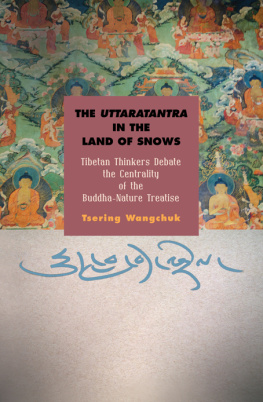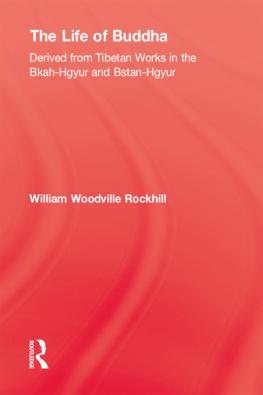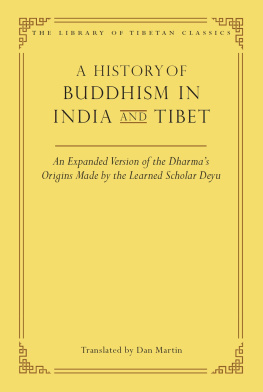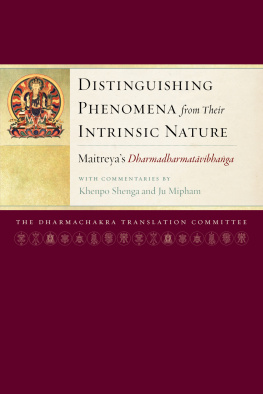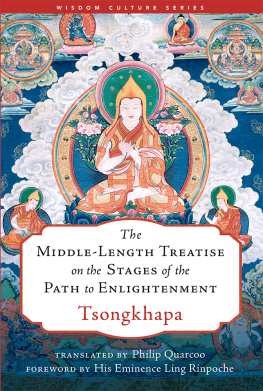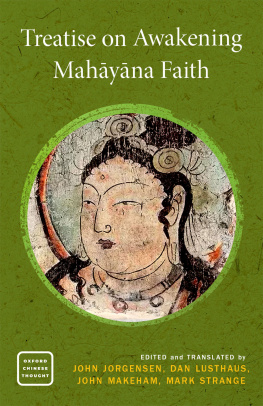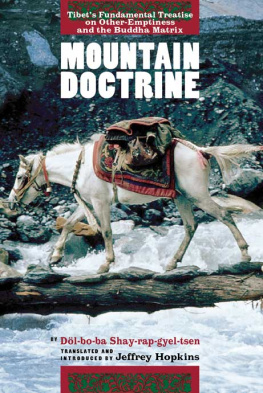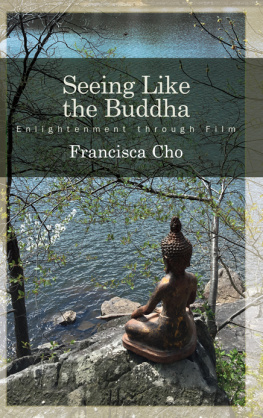The Uttaratantra
in the Land of Snows
The Uttaratantra
in the Land of Snows
Tibetan Thinkers Debate the Centrality
of the Buddha-Nature Treatise
TSERING WANGCHUK
Published by State University of New York Press, Albany
2017 State University of New York
All rights reserved
Printed in the United States of America
No part of this book may be used or reproduced in any manner whatsoever without written permission. No part of this book may be stored in a retrieval system or transmitted in any form or by any means including electronic, electrostatic, magnetic tape, mechanical, photocopying, recording, or otherwise without the prior permission in writing of the publisher.
For information, contact State University of New York Press, Albany, NY
www.sunypress.edu
Production, Eileen Nizer
Marketing, Anne M. Valentine
Library of Congress Cataloging-in-Publication Data
Name: Wangchuk, Tsering, author
Title: The Uttaratantra in the land of snows: Tibetan thinkers debate the centrality of the buddha-nature treatise / Tsering Wangchuk: author.
Description: Albany : State University of New York Press, [2017] Includes bibliographical references and index.
Identifiers: ISBN 9781438464657 (hardcover : alk. paper) | ISBN 9781438464671 (e-book)
Further information is available at the Library of Congress.
10 9 8 7 6 5 4 3 2 1
To my loving family
and in memory of
Awu, Amny, and Gen Lozang Gyatso
Contents
Acknowledgments
This book is a product of a long series of conversations with my teachers and colleagues. While words fall short of capturing my immense gratitude for my teachers and colleagues, it is to them that I express my deepest appreciation for any merit that this book might have. To the late Gen Lozang Gyatso, Gen Damch Gyeltsen, and Gen Gyatso, who taught me Buddhism by example through their ethical standards, contemplative composure, and the knowledge of a Buddhist path and doctrine, I owe my sincerest gratitude. My sincere thanks also go to Gen Kalsang Damdul for his unstaggering support to my project. I also want to thank my classmates at the Institute of Buddhist Dialectics in India for teaching me how to put every Buddhist topic that we studied to a critical inquiry.
I also want to express my gratitude to Professors Ven. Dakpa Sengey, Khenpo Sonam Gyatso, Geshe Yeshe Thabkhey, and Ven. Wangchuk Dorjee Negi at the Central University of Tibetan Studies in Sarnath for their generous time in answering questions regarding many difficult topics found in several Tibetan commentaries on the Uttaratantra . My gratitude also goes to Khenpo Choenang of Jonang Monastery in Shimla with whom I had multiple interviews about the buddha-nature concept. Much appreciation goes to the American Institute of Indian Studies for the grant that supported the early stage of my research in India.
In America, I had the privilege to study Buddhism in an academic setting with Professors Jeffrey Hopkins, David Germano, Karen Lang, and Paul Groner of the University of Virginia. I thank all of them for teaching me the tools for studying Buddhist texts. In particular, I would like to extend my heartfelt appreciation to Professors Hopkins and Germano, who not only mentored me during my years as a doctoral student at UVA, but who have continued to offer me guidance and support since I completed my doctoral program. Their scholarship continues to serve as a model for my own work.
The section on Rinchen Yeshs view of the Uttaratantra from has appeared as In Defense of His Guru: Dratsepas Rebuttal to the Challenges Articulated by the Proponents of the Other-Emptiness Doctrine in Journal of Indian Philosophy 39.2 (2011): 14765, with kind permission from Springer Science+Business Media.
Dr. Gareth Sparham and Professor Klaus-Dieter Mathes read the entire manuscript and offered me invaluable comments and suggestions that gave a new shape to my book. I offer my sincerest gratitude to them for their time and guidance. I am also indebted to SUNYs external reviewers for offering me constructive feedback on the book. My sincerest gratitude also goes to Christopher Ahn, Jessica Kirschner, Eileen Nizer, and Anne Valentine at SUNY for their guidance and editing help. Finally, I want to thank my colleagues at the University of San Francisco for their kind support.
Introduction
General Remarks
Toward the end of a three-year course on Candrakrtis (ca. 570640) Madhyamakvatra at the Institute of Buddhist Dialectics in Dharamsala, which primarily offers a monastic curriculum based on commentaries and works drawn from the Geluk ( dge lugs ) School of Tibetan Buddhism, my whole class humbly requested that our instructor His response, to our disappointment, was that since he had not received the expository transmission ( bshad rgyun ) of the Uttaratantra from any of his masters, he could not teach it to us. This rather traditional reply from our elderly guru was quite difficult even for the then young student-monks, who grew up in India and Nepal in the later part of the twentieth-century, to fully comprehend. His response had nothing to do with his lack of knowledge, insofar as many contemporary Tibetan scholars, including the teacher, fervently believe that the Uttaratantra is easier to intellectually understand than Madhyamaka classics, such as the Madhyamakvatra and Ngrjunas (ca. 200) Madhyamakakrik . Ironically, our teacher had also constantly reminded us that the meaning of the emptiness of inherent existence taught in the Madhyamakvatra , a treatise that Geluk scholar-monks hold dear to their hearts, and the meaning of tathgata-essence explicated in the Uttaratantra was the same. He said this even though it is well known that the Geluk School prefers the Madhyamakvatra s exposition of ultimate truth over the Uttaratantra s exposition.
an extremely learned young monk from the Amdo region of cultural Tibet. The latter was affiliated with the Jonang ( jo nang ) School of Tibetan Buddhism, which holds a view of emptiness drastically different from that of the Geluks perspective, articulated by the abovementioned teacher in Dharamsala, India. The main text that we used in this class was Dlpopas ( dol po pa shes rab rgyal mtshan , 12921361) Mountain Doctrine ( ri chos nges don rgya mtsho ), a seminal work on the Mahyna path from the perspective of the Jonang School, which quotes passages from the Uttaratantra liberally. It was in this context that the visiting scholar frequently mentioned in class that the emptiness taught in the Madhyamakvatra was not complete ( nyi tshe ba ), whereas the tathgata-essence explicated in the Uttaratantra was the ultimate emptiness.
These two contemporary views of the Uttaratantra vis--vis the Madhyamakvatra demonstrate the complex relationship that the two Indian treatises share in terms of their articulations of ultimate truth for many Tibetan scholars. However, the crucial role that the Uttaratantra played in the history of Tibetan Buddhism is yet to receive the scholarly attention it deserves, without which we would only have an impartial knowledge about the historical significance of the Madhyamakvatra in Tibet. Whereas a considerable number of Western philologists, historians, and philosophers have written about Candrakrtis Madhyamakvatra and its place in the intellectual history of Tibetan Buddhism, no Western trained scholar to date has dealt systematically with the place of the Uttaratantra in that history, despite its importance within Tibetan Buddhism in general, and Buddhist scholasticism in particular. The two contemporary Tibetan scholars positions on the relative merits of the Uttaratantra vis--vis the Madhyamakvatra and the dearth of modern scholarship on the Uttaratantra in Tibet increased my interest in the treatise and led me to a study of the Tibetan commentaries on the Indian commentarial work. Over the course of my study, I set about unraveling the complex processes of the making of the Uttaratantra in Tibet, looking for answers to the many historical and doctrinal questions it raises.

